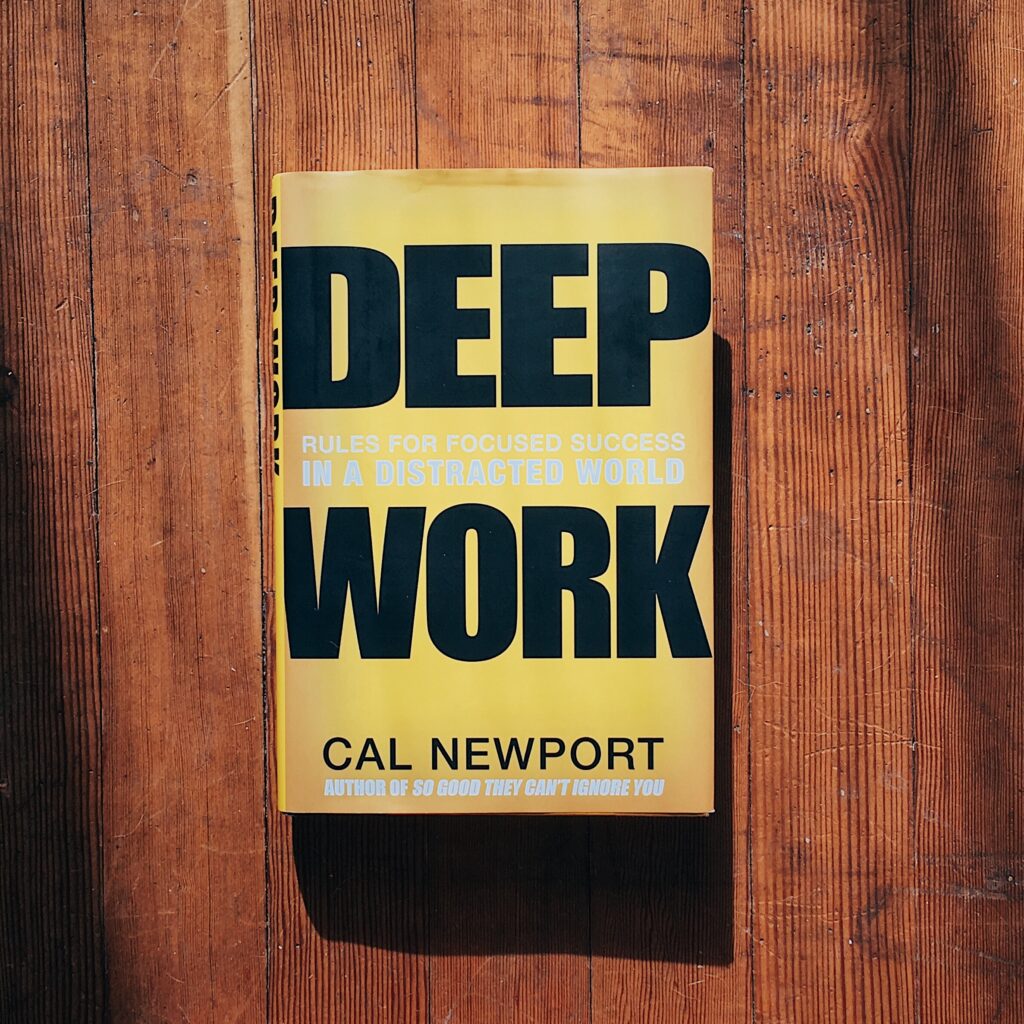
8 Lesson from Cal Newport’s Book “Deep Work”
In his book Deep Work: Rules for Focused Success in a Distracted World, Cal Newport discusses the importance of focusing on challenging tasks. Concentrating deeply can seem like a superpower in today’s busy world, where we are constantly interrupted by emails, notifications, and social media.
Newport believes that this kind of focused work makes us more productive and helps us stand out in a society that often values quick, shallow tasks over real achievements. By practicing deep work, we can unlock our full potential and significantly improve the value we bring to our jobs and communities. Let’s explore the excellent benefits of developing this essential skill.

1. Deep Work vs. Shallow Work
Cal Newport identifies two main types of work: “deep work” and “shallow work.”
Deep work requires a lot of mental effort and focus. It involves diving deeply into a specific task and using careful thought and analysis to produce high-quality results. This work is challenging, but it helps us develop our skills and create valuable outcomes without distractions.
On the other hand, shallow work includes activities that don’t require much thinking and can often be done while multitasking. Examples of shallow work involve answering emails, organizing schedules, or folding laundry. This work is usually less mentally taxing and more routine, making it easier to do without full attention.
Understanding the difference between these two types of work can help us better manage our time and energy.
2. Commit to More Deep Work to Achieve Greatness

The concept of deep work isn’t new. Peter Drucker, the father of modern management, referred to it as “knowledge work.” Knowledge workers are those who perform this type of work. Their main asset is their ability to combine specialized knowledge to create valuable results.
Cal Newport, however, has a more specific view of deep work. He emphasizes that in today’s world, many service-oriented jobs fall under the broad umbrella of knowledge work, but he believes most jobs involve simple tasks. Instead of focusing on meaningful thinking and strategizing, our daily work often consists of activities that don’t require much deep thinking.
To truly excel in our work and foster greatness, we need to commit more time to deep work, where we can focus profoundly and produce our best results.
3. Focus At An Elite-Level
Achieving an elite level of work starts with committing to an elite level of focus. Think of your job as a craft: refining your skills and approaching your tasks with respect and care can create real meaning in your daily professional life.
Deep work is all about focusing intensely without distractions. When you allow distractions to creep in, it drains your mental energy and reduces your ability to engage in deep work over time. Switching from one task (Task A) to another (Task B) doesn’t happen instantly. Some of your attention stays stuck on Task A, primarily if you didn’t focus on it before switching. Even after completing Task A, it can take time for your mind to concentrate on Task B fully.
To focus at an elite level, you must dedicate time and create an environment with minimal distractions. To foster this habit, many practice deep work and set aside specific times to work without interruptions as a habit. This commitment is important because knowing what truly matters helps you see what doesn’t.
However, embracing deep work means prioritizing it over other tasks. Many modern open workspaces are not ideal for deep work because of all the distractions. Try wearing headphones or scheduling deep work hours as part of your daily routine to manage this.
4. Create Routines and Rituals For Deep Work

Shallow work doesn’t lead to high-quality results and can even make it harder for us to concentrate intensely in the future. To truly excel, creating an environment that encourages deep work and establishing daily routines that support it is essential.
As Newport puts it, he plans his days around a solid block of deep work while scheduling unavoidable shallow tasks into smaller time slots around that core focus. Spending three to four hours daily, five days a week, on uninterrupted and focused work can yield valuable results.
This advice is relevant in a work setting, too. For instance, it is crucial to set aside specific times each day for deep work. Concentrating on just one task allows you to engage in authentic, deep work. Mastering complex subjects demands focus and dedication.
Newport also emphasizes that quickly learning challenging things and efficiently producing high-quality work are essential in today’s economy. To understand complex topics swiftly, you need to focus intensely without distractions.
He describes our work as a craft: refining our skills and treating our tasks carefully. Like skilled artisans, we can find meaning in our daily professional activities.
Deep Work: This refers to professional tasks completed in a distraction-free environment that challenge one’s thinking and push one’s mental limits. These focused efforts create new value, enhance one’s skills, and are difficult for others to replicate.
Shallow Work: This includes simple, logistical tasks that don’t demand much thinking and can be done while distracted. These tasks usually don’t create much new value and are easy for anyone.
5. Willpower is a Limited Resource
We each have a limited amount of willpower to use every day. By establishing a routine centered around creating an environment conducive to deep work, we can minimize the need to exert willpower to avoid distractions. However, staying productive—both at work and in our personal lives—requires understanding that willpower is finite.
The key is developing a deep work habit incorporating rituals and routines, which help minimize distractions. Instead of relying heavily on willpower, focus on cultivating consistent states of concentrated work. Approach your tasks with the mindset that work is a craft of specific skills you need to refine. Moving toward a structured work-life routine designed to produce high-quality output can elevate your productivity to a higher level.
“The key to developing a deep work habit is to move beyond good intentions and add routines and rituals to your working life designed to minimize the amount of your limited willpower necessary to transition into and maintain a state of unbroken concentration.”
“Human beings, it seems, are at their best when immersed deeply in something challenging.”
“To build your working life around the experience of flow produced by deep work is a proven path to deep satisfaction.”“You have a finite amount of willpower that becomes depleted as you use it.”
“The key to developing a deep work habit is to move beyond good intentions and add routines and rituals to your working life designed to minimize the amount of your limited willpower necessary to transition into and maintain a state of unbroken concentration.”
6. Create a Deep Work Philosophy

Choosing the right philosophy to help you achieve your goals while matching your personality can be challenging but essential.
Some people choose a monastic philosophy focused on deep work. This approach requires careful scheduling, reducing distractions from shallow tasks, and cutting out other commitments to make time for focused work. While this method might seem strict, it can be effective for many.
Another option is the bimodal approach, inspired by Carl Jung. This method encourages splitting your time between work and personal life. You would have periods of deep and shallow work and plenty of unscheduled time to relax and recharge.
A more systematic approach, often used by writers, involves setting aside long, dedicated periods for deep work every day, specifically aimed at achieving specific goals.
Lastly, some people fit deep work into their lives whenever they can. The key is to choose a philosophy that aligns with your needs and personality. Finding the right fit will help you integrate deep work more effectively into your routine.
Remember, “You need a clear philosophy for including deep work in your professional life.” Select a philosophy that suits your unique situation—otherwise, it could disrupt your deep work habits before they take hold.
7. Expertise Requires Deliberate Practice.
There is a clear difference between average performance and expert performance. Expert performance is developed through years of hard work and a strong commitment to continual improvement. This process, known as deliberate practice, involves various methods to enhance skills.
Deliberate practice means focusing on a specific skill with the goal of improving it. It works like an iterative design, where you refine your approach based on feedback. This feedback helps you measure your progress and identify areas for further improvement.
As noted, “The differences between expert performers and ordinary adults come from a life-long commitment to improving skills in a particular area.”
The main components of deliberate practice include:
- Concentrate on a specific skill you want to improve or a concept you want to master.
- Receiving feedback that allows you to adjust your methods and keep your focus on what’s most beneficial for your growth.
8. Rest To Accompany Deep Work

Deep work is a valuable strategy; some tools can help you make the most of it. As you tackle essential tasks, consider using these tools to make a real difference in your focus and productivity. If you find a tool that works for you, stick with it. For instance, put aside any work-related issues at the end of your workday and don’t recheck them until the next day.
When choosing tools, consider what matters in your life and work—this is the Craftsman Approach. Before adopting any new tool, ensure its positive effects on your goals outweigh any negative aspects. “The first step [to the Craftsman Approach] is to identify your main goals in both your professional and personal life.”
Once you finish work, it’s essential to take time to rest. Avoid checking emails, and don’t let stress take over your mind. Planning can wait! Getting adequate rest is vital to doing deep work effectively.
There are three key reasons why downtime is so important:
- Downtime Helps You Gain New Insights: Taking breaks can lead to new ideas.
- Downtime Recharges Your Energy: You need to rest to have the energy for focused work.
- Evening Downtime Is Often More Important Than Extra Work: The tasks you might tackle during your break aren’t usually that crucial.
To stay focused, schedule specific times to use the Internet and stick to that plan. Avoid distractions outside of those times. Deep work involves two main goals: improving your concentration and maximizing your focused time.




